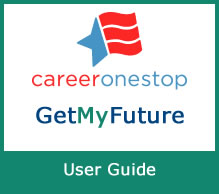
 April is Financial Literacy Month—30 days dedicated to improving people’s personal finances. In honor of those 30 days, Money Management International created a 30-step path to financial wellness. Whatever the state of your personal finances, getting started with those 30 steps can help bring you to the next level.
April is Financial Literacy Month—30 days dedicated to improving people’s personal finances. In honor of those 30 days, Money Management International created a 30-step path to financial wellness. Whatever the state of your personal finances, getting started with those 30 steps can help bring you to the next level.
In addition to following a general path toward financial health, there are certain life events that require sound financial decisions. One of the biggest is the decision to pursue higher education—whether that’s a short-term training program, a college degree, or even graduate school.
Education and your financial health
Education can have two big impacts on your financial health:
1) Education pays. It’s well documented that more education boosts your lifetime earnings. Check out the data below:
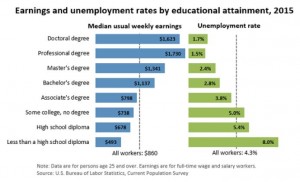
2) Education is expensive. Even if you don’t personally know someone with a large debt due to school or college costs, you’ve probably read plenty about the issue. According to Bloomberg News, Americans are now collectively $1.3 trillion in student-loan debt.
Both of the above are true: furthering your education has the potential to boost your earnings AND put you in debt. The education-planning challenge is to get the most benefit for the lowest cost. So how do you do that? Get started by researching both career fields and any schools you are considering.
Research your career goals
Before getting started in training or a college program, take the time to see how employable you’ll be with your new skills. CareerOneStop has lots of free tools to help you understand the job market:
- See which careers are growing the fastest.
- Check out average wages or salary for your career of choice.
- Get more career details for careers you’re considering.
Research schools and programs
Once you have an idea of the career field you want to train in, take the time to research schools and programs:
- Visit College Scorecard to see the average annual cost for the school you want to attend. You’ll also be able to see students’ typical total debt amounts, monthly loan payments, and salaries after graduation. Look at all of the information provided on this website to help you figure out if the school would be a good investment for you.
- Visit with admissions and financial aid staff at your schools of choice. Ask about total costs, graduation rates, loan amounts, and employment of graduates.
- Check to see if a school or program is accredited by visiting their website or the U.S. Department of Education’s Accreditation Search.
- Find more tips and information on paying for school.

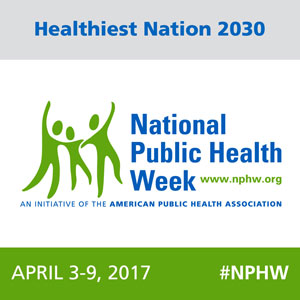
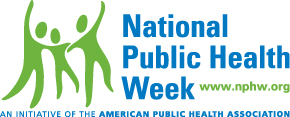 You might not think of education as a matter of health, but organizers of
You might not think of education as a matter of health, but organizers of 
 A conversation with an employer about your disability involves several decisions.
A conversation with an employer about your disability involves several decisions.

 Pi Day also offers a great opportunity to get kids thinking about careers. Lots of students are aware that STEM careers are some of the hottest career options they’ll have after graduation. And lots can name stem careers such as Engineer, Scientist, or Video Game Designer. This Pi Day, you can introduce students to a slew of STEM careers they may not have ever heard about.
Pi Day also offers a great opportunity to get kids thinking about careers. Lots of students are aware that STEM careers are some of the hottest career options they’ll have after graduation. And lots can name stem careers such as Engineer, Scientist, or Video Game Designer. This Pi Day, you can introduce students to a slew of STEM careers they may not have ever heard about.
 College students, start your engines. If you’re hoping to work in an internship this summer, it’s time to rev up your internship research and application efforts: March is the peak month for internship recruiting and hiring for summer interns in the U.S.
College students, start your engines. If you’re hoping to work in an internship this summer, it’s time to rev up your internship research and application efforts: March is the peak month for internship recruiting and hiring for summer interns in the U.S.


 Have you ever thought you knew what would sell a product better than the people in charge? A career as a market research analyst will put you in touch with consumers to learn what they really think about and want in the products and services they purchase.
Have you ever thought you knew what would sell a product better than the people in charge? A career as a market research analyst will put you in touch with consumers to learn what they really think about and want in the products and services they purchase.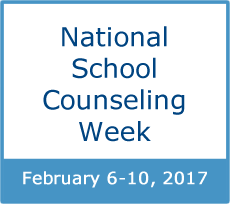
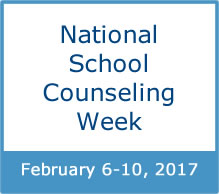 The American School Counselor Association (ASCA) sponsors the week to bring attention to the unique contributions of professional school counselors in schools across the country—as well as to highlight how students benefit from the work that school counselors do. National School Counseling Week celebrates the impact school counselors can have in helping students achieve school success and plan for a career.
The American School Counselor Association (ASCA) sponsors the week to bring attention to the unique contributions of professional school counselors in schools across the country—as well as to highlight how students benefit from the work that school counselors do. National School Counseling Week celebrates the impact school counselors can have in helping students achieve school success and plan for a career.